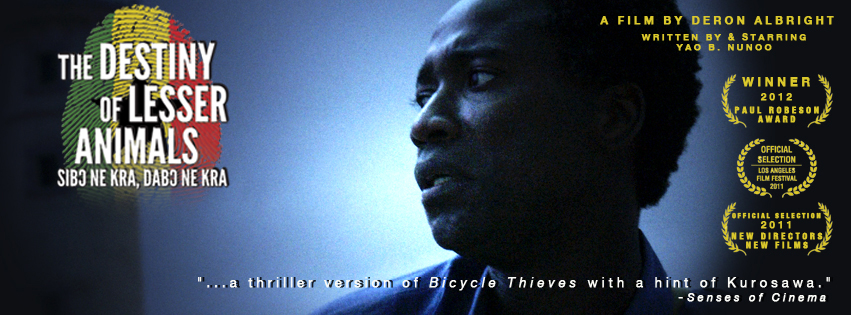When Yao Nunoo first arrived in the United States from Ghana 16 years ago, the then 22-year-old African was building his life as a struggling immigrant artist.
He was a nomad in a strange land, passing through city after city before settling in West Philly in 2002. For 11 years, the now 37-year-old screenwriter/actor has thrived in his “home away from home,” blending into the motley crew of arts and culture alive west of the University of Pennsylvania. With a handful of small productions, a full-length feature, and acting credits under his belt, Nunoo has forged a name for himself in the community—one further elevated by his recent African Film Development Awards’ (AFDA) “Best African Actor in Diaspora” nomination for his role as Ghanaian National Police Inspector Boniface Koomsin in the Ghana-based thriller, The Destiny of Lesser Animals.
“It’s wonderful and flattering to be nominated,” said Nunoo. The AFDA take place June 29 in Tanzania. “The idea behind the African Film Consortium coming up with the AFDA is about contributions to the medium in Africa or about Africa that supports African development and progress. That focus makes the recognition doubly awesome.”
Written by Nunoo and directed by Deron Albright, The Destiny of Lesser Animals follows the desperate Boniface as he races to recover his stolen counterfeit passport, enlisting police help under the guise of searching for a stolen pistol. This fabricated crime is a necessary means to an end for the Ghanaian inspector—for him, the passport is more than just an illegitimate traveling document. It’s his way back to the United States, the country that deported Boniface nearly a decade ago. But, in the mist of his lie, Boniface is quickly faced with investigating two actual crimes: an armed robbery and the murder of an American ex-pat. It leads to the revelation of his real motivations, turning the spiraling cortex of deception into one of redemption.It’s a story heavily defined by the film’s title. Taken from an old Ghanaian saying, “Sibo ne Kra sun Dabo ne Kra” (or “The destiny of a leopard is not the same as the destiny of a lesser animal”), The Destiny of Lesser Animals, in name and shape, is redolent of life’s multiple paths and the differences in between. But the film, shot along Ghana’s southern coast and eastern region, is also about the country itself, and “tension and contrast” of its old and new forms, said Nunoo.
“We wanted to show a new, palpable story about Ghana; and Africa to a larger extent, different from the dominating iconography and narratives we all are used to. It’s not all about HIV or civil wars or jungles and safaris or hunger and strife and destitution,” Nunoo told West Philly Local. “It has been really difficult (and it still is) for folks to tell African stories and show images of the continent without one or a combination of the aforementioned overriding themes. We want to change that and we need to change that.”
“It is very important to highlight an experience and the way you do so in by granting the power of subjectivity and honest perspective. If not, you will always end up with a bowl of soup cooked solely with stereotypes,” he added.
While The Destiny of Lesser Animals is based overseas, its body was wrought in West Philly. The first of draft of the script was written in seven months in 2007 while Nunoo was enrolled in the University of Pennsylvania’s film studies undergrad program and watching droves of Italian Neorealism and Postwar Japanese films. (“[Akira] Kurosawa, [Vittorio] De Sica, [Federico] Fellini and also [Ousame] Sembene and Diop Mambety are all there in this film. I owe them so much,” Nunoo said.) It was also crafted while Nunoo downed copious amounts of caffeine from the Green Line Cafe, Satellite Cafe. “and all the cool West Philly spots in between,” revised a few times before going into production in the winter of 2009. After taking five years to complete, Destiny was released in 2012.
The Destiny of Lesser Animals wasn’t a quite entry into the cinematic vault, though. While touring the 2011 film circuit, Destiny received Official Selection status from seven cinema fêtes: the Chicago International Film Festival, Starz Denver Film Festival, Los Angeles Film Festival, Hill Valley Film Festival, New Directors/New Films, Seattle International Film Festival, and Philadelphia Film Festival, during which it screened at West Philly’s International House Philadelphia (37th and Chestnut) and Old City’s the Ritz East.
“It’s been a blessing and an adventure, and also a feeling of vindication that there are audiences that want to see the whole picture of the continent and not just stereotypes,” Nunoo said of these honors. “It affirms my notion that there are many, many beautiful stories to tell from where I’m from.”
Local endorsement has also been remarkable, said Nunoo. According to the Ghanaian screenwriter, his creative focus on Africa and the immigrant experience has garnered him a lot of support and generosity from resident mainstays, Dahlak and Gojjo, two well-established African-owned restaurants. More so, Nunoo has also had discussions with various locals about screening Destiny in West Philly once again. “It would be a wonderful opportunity for me to be able to bring it back here, my second home,” he said.
The Destiny of Lesser Animals is Nunoo and Albright’s third collaboration. Nunoo appeared as the lead in Albright’s 2006 short, The Legend of Black Tom (a 2005 PFF favorite), and co-wrote the screenplay for the Philly-based director’s project Invisible Son, which chronicled a West Philly resident’s juxtaposed life as a new father and undocumented immigrant evading immigration authorities. Nunoo is currently working on a screenplay adaption of Ghanaian poet Nii Ayikwei Parkes’ whodunit book, “The Tail of the Blue Bird,” which he hopes to finish by year’s end.
–Annamarya Scaccia



![Yao_Nunoo_01_Headshot_AFDA_6_12_13[1]](https://www.westphillylocal.com/wp-content/uploads/2013/06/Yao_Nunoo_01_Headshot_AFDA_6_12_131-218x300.jpg)



Recent Comments